Graduate student Gloria Oladeji was selected as a fellow for the upcoming year in the Food and Nutrition Section of the American Public Health Association. This selection was made from a highly competitive pool of over 100 applicants. She was also elected as the Student Liaison for the upcoming year.
Author: Janice Berriault
Sarah Rendon Garcia’s article on migrant health care in Think Global Health
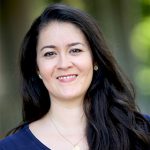 Sarah Rendón García recently first authored an opinion piece for Think Global Health on the ripple effects of Federal bans to migrant health care on U.S. Citizens in the areas of early childhood education, addiction recovery services, and mental health programs: Read the article here https://www.thinkglobalhealth.org/article/how-federal-bans-to-migrant-health-care-could-affect-u-s-citizens
Sarah Rendón García recently first authored an opinion piece for Think Global Health on the ripple effects of Federal bans to migrant health care on U.S. Citizens in the areas of early childhood education, addiction recovery services, and mental health programs: Read the article here https://www.thinkglobalhealth.org/article/how-federal-bans-to-migrant-health-care-could-affect-u-s-citizens
Kim Gans featured in UConn Today
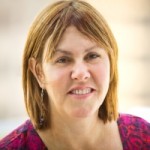 Kim Gans was featured in UConn Today about a program designed to reduce social isolation impacting homebound older adults: Read the article here https://today.uconn.edu/2025/11/training-program-delivers-resources-to-reduce-social-isolation-among-seniors/
Kim Gans was featured in UConn Today about a program designed to reduce social isolation impacting homebound older adults: Read the article here https://today.uconn.edu/2025/11/training-program-delivers-resources-to-reduce-social-isolation-among-seniors/
Dr Starlin Astacio, HDFS Alumni Spotlight, September 2025
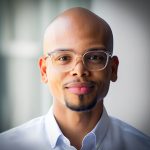 Dr. Starlin Astacio earned his B.S. in HDFS from UConn in 2016. Since then, Starlin has built a career rooted in healing, advocacy, and education. He subsequently earned an M.S. in Couple and Family Therapy from Central Connecticut State University in 2019 and a Ph.D. in Couple and Family Therapy from Antioch University in 2023. For over a decade, he has worked as a bilingual relational psychotherapist, clinical supervisor, and DEI leader, centering his clinical, supervisory, and research expertise around LGBTQ+ communities. During his time at Hartford Healthcare, he co-founded and co-chaired the DEI Council and executive committees at Charlotte Hungerford Hospital, and in 2021, he was honored with the AAMFT Diversity Scholarship for Emerging Leaders for his ongoing work in health equity and inclusion.
Dr. Starlin Astacio earned his B.S. in HDFS from UConn in 2016. Since then, Starlin has built a career rooted in healing, advocacy, and education. He subsequently earned an M.S. in Couple and Family Therapy from Central Connecticut State University in 2019 and a Ph.D. in Couple and Family Therapy from Antioch University in 2023. For over a decade, he has worked as a bilingual relational psychotherapist, clinical supervisor, and DEI leader, centering his clinical, supervisory, and research expertise around LGBTQ+ communities. During his time at Hartford Healthcare, he co-founded and co-chaired the DEI Council and executive committees at Charlotte Hungerford Hospital, and in 2021, he was honored with the AAMFT Diversity Scholarship for Emerging Leaders for his ongoing work in health equity and inclusion.
Today, he maintains a private practice in Connecticut and New York that is inclusive, innovative, and grounded in the healing power of Self-Leadership. He focuses his clinical work on addressing the disparities faced by minoritized populations, using culturally responsive and trauma-informed modalities like Internal Family Systems (IFS). He also serves as associate faculty at Antioch University New England, where he teaches foundational courses and supervises master’s students in the Couple and Family Therapy program. In addition, he teaches in the Sexuality Education Program at the University of Guelph in Canada, educating health professionals on inclusive sex education practices. He also remains connected to UConn, where he has taught courses in the Human Development and Family Sciences department—an experience that continues to hold deep meaning for him. Looking ahead, his long-term goal is to build an institute that offers clinical services to clients, practicum and supervision opportunities for students, and ongoing training and workshops for psychotherapists to expand their scope of practice.
Outside of work, he finds joy in visiting family in the Caribbean, spending time with his loved ones, and supporting community initiatives that empower underserved populations. He believes in maintaining wellness from the inside out—integrating mental and physical self-care into his daily life has been transformational. He is deeply grateful to UConn HDFS for laying the foundation of his professional journey and for continuing to be a meaningful part of his path.
Chizobaum Nweke, HDFS Graduate Student Spotlight, September 2025
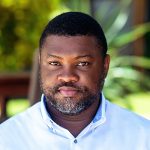 Chizzy is an HDFS PhD student who first joined the program in 2023. He was born in Southeastern Nigeria and holds a bachelor’s degree in Biochemistry from Nnamdi Azikiwe University, a medical degree from Igbinedion University, and a master’s degree in HDFS from the UConn. Before coming to UConn, Chizzy worked as a general medical practitioner in Nigeria and as a clinical instructor at St. George’s University School of Medicine, Grenada.
Chizzy is an HDFS PhD student who first joined the program in 2023. He was born in Southeastern Nigeria and holds a bachelor’s degree in Biochemistry from Nnamdi Azikiwe University, a medical degree from Igbinedion University, and a master’s degree in HDFS from the UConn. Before coming to UConn, Chizzy worked as a general medical practitioner in Nigeria and as a clinical instructor at St. George’s University School of Medicine, Grenada.
Chizzy’s interest in gerontology can be traced to his time working as a medical practitioner. During his clinical encounters with older patients, he often found these patients’ problems unique and misunderstood. These, plus an eagerness to work with his UConn advisor, Dr. Candi Nwakasi, drew him to UConn. His research centers focuses on psychosocial and sociocultural drivers of health, with a particular emphasis on cancer survivorship and cognitive health. As an aspiring academic, Chizzy hopes to champion efforts to modify the curriculum in the medical, allied, and other affiliated health sciences, toward an acceptance and normalization of a healthcare delivery model that is holistic and caters to the needs of all people irrespective of their age bracket.
Chizzy loves sports, mainly soccer and track and field events. He also enjoys watching TV shows, cooking, and gardening.
Angel Reed, HDFS Graduate Student Spotlight, September 2025
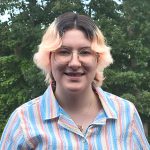 Angel Reed is a first-year PhD student working with Dr. Eva Lefkowitz, specializing in romantic relationships (specifically queer relationships). In Spring 2025, they graduated summa cum laude from the University of Alabama (UA) with a B.S. in Human Development and Psychology. As an undergraduate, they became passionate about researching romantic relationships and the various factors that encourage or discourage relationship success. Angel’s undergraduate thesis focused on plurisexual individuals (people attracted to multiple genders), and how different perceptions of their relationships are associated with their satisfaction. They presented this research at the UA Undergraduate Research and Creative Activities Conference (URCA). Additionally, although Angel’s focus is romantic relationships, they have a strong interest in child development and positive parenting. They presented a project concerning children’s trust when learning and decision-making at both URCA and at the 2024 Cognitive Development Society Conference in Pasadena, CA.
Angel Reed is a first-year PhD student working with Dr. Eva Lefkowitz, specializing in romantic relationships (specifically queer relationships). In Spring 2025, they graduated summa cum laude from the University of Alabama (UA) with a B.S. in Human Development and Psychology. As an undergraduate, they became passionate about researching romantic relationships and the various factors that encourage or discourage relationship success. Angel’s undergraduate thesis focused on plurisexual individuals (people attracted to multiple genders), and how different perceptions of their relationships are associated with their satisfaction. They presented this research at the UA Undergraduate Research and Creative Activities Conference (URCA). Additionally, although Angel’s focus is romantic relationships, they have a strong interest in child development and positive parenting. They presented a project concerning children’s trust when learning and decision-making at both URCA and at the 2024 Cognitive Development Society Conference in Pasadena, CA.
Angel has an in-press article at the UA Journal of Science and Health, and is working on two other soon-to-be-submitted manuscripts. They continue to collaborate on three other projects at UA remotely from Connecticut. At UConn, they plan to build upon the ideas in their undergraduate thesis, and study how one’s views about their relationship are associated with their personal happiness and relationship satisfaction. They are especially interested in the power of perception over reality, and plan to examine how perceptions of one’s relationship differ when comparing self-perceptions to perceptions of individuals outside the relationship (and whether these differences impact relationship success). Angel’s long-term goal is to become a university professor and continue their research, including establishing a lab where they can introduce undergraduates to research.
Angel grew up in Los Angeles before moving to Alabama and looks forward to experiencing New England with their fiancé. In their free time, Angel enjoys going to the movies, playing video games, petting their tuxedo cat, Enyo, and collecting vintage oddities to decorate their apartment.
Terry Berthelot, HDFS Faculty Spotlight, September 2025
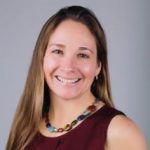 Terry was promoted to Associate Professor-in-Residence effective August, 2025!
Terry was promoted to Associate Professor-in-Residence effective August, 2025!
Terry Berthelot joined the HDFS Department in 2016. Her research and advocacy efforts are primarily about access to healthcare for people who are sixty-five and older and for people living with disabilities. She received her master’s degree in social work (MSW) from Syracuse University after which she worked as a community developer within Syracuse’s Economic Development Zone. She then moved to Mississippi, where she directed a Joint Commission Accredited hospice program. Finding herself fascinated by the legal and ethical questions surrounding death and dying, Terry pursued her law degree at the University of Mississippi (Ole Miss). While at Ole Miss, she participated in post-conviction death penalty mitigation appeals. After graduating from law school, she joined the Center for Medicare Advocacy (CMA), a national not-for-profit law firm that, through education and advocacy, works to ensure that people who are sixty-five and older and people with disabilities have access to excellent healthcare and insurance coverage for that care. Terry is currently a member of the National Academy of Elder Law Attorneys’ (NAELA) Board of Directors and is on the editorial board for NAELA News. She and her spouse have a remarkable teen-age daughter and a reasonably well behaved three-year-old dog. They spend as much time as they can cruising their sailboat, Finisterre.
Candi Nwakasi selected as UConn Pepper Scholar
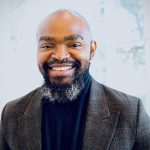 Candi Nwakasi was featured in UConn Today for his recent selection as a UConn Pepper Scholar. Read all about it in UConn Today https://today.uconn.edu/2025/08/meet-uconn-pepper-centers-2025-rec-pepper-scholars/
Candi Nwakasi was featured in UConn Today for his recent selection as a UConn Pepper Scholar. Read all about it in UConn Today https://today.uconn.edu/2025/08/meet-uconn-pepper-centers-2025-rec-pepper-scholars/
Rachel Vick, (’21 BA), HDFS Alumni Spotlight, August 2025
 Rachel began her time at UConn in Fall 2017. It took her until her junior year to realize she wanted to major in HDFS. When not in class or studying at the library, you would find Rachel running all over campus. She was on the cross country, indoor, and outdoor track teams for 4 years. After earning her bachelor’s degree in 2021, she moved to Massachusetts where she accepted her first job offer from The New England Center for Children. Their mission and vision aligned with her goals and career path. This non-profit organization not only offers many community-based programs, but it also offers extensive research on autism and applied behavior analysis. The kiddos, coworkers and opportunities during her time at the Center have shaped her into the young professional that she is today. Rachel even learned what it is like to run a marathon! She was one out of four runners chosen to run and fundraise for the Center at the Boston Marathon in 2022. Although she enjoyed every experience and opportunity there, she knew she needed a change. After her time in Massachusetts, she decided to move back home to South Jersey, and even saved some time (and some money) to travel through Europe.
Rachel began her time at UConn in Fall 2017. It took her until her junior year to realize she wanted to major in HDFS. When not in class or studying at the library, you would find Rachel running all over campus. She was on the cross country, indoor, and outdoor track teams for 4 years. After earning her bachelor’s degree in 2021, she moved to Massachusetts where she accepted her first job offer from The New England Center for Children. Their mission and vision aligned with her goals and career path. This non-profit organization not only offers many community-based programs, but it also offers extensive research on autism and applied behavior analysis. The kiddos, coworkers and opportunities during her time at the Center have shaped her into the young professional that she is today. Rachel even learned what it is like to run a marathon! She was one out of four runners chosen to run and fundraise for the Center at the Boston Marathon in 2022. Although she enjoyed every experience and opportunity there, she knew she needed a change. After her time in Massachusetts, she decided to move back home to South Jersey, and even saved some time (and some money) to travel through Europe.
In the fall of 2023, Rachel wanted another change, but this time with a warmer climate, so she packed her bags and moved to Charleston, SC. She accepted a job offer from Pattison’s Academy, a non-profit organization that serves individuals with disabilities from birth through 24 years old in Charleston county. She worked in their charter school in 2023-2024, and as the assistant camp director for their 2024 summer camp. Since the fall of last year, Rachel has worked as an Early Intervention Service Coordinator, serving children birth to 3 with special needs or developmental delays. After less than a year in this job, Rachel has learned so much from each kiddo, every therapist, and especially her coworkers. Each day looks a bit different, and every day Rachel learns something new. She feels as though her detail-oriented, organizational skills, social skills, self-motivation, desire to learn and ability to learn quickly all help her manage a healthy work-life balance as an EI. She plans to stay here, or at least down south, for a few more years. But you never know what will happen in a year or two.
Rachel likes to emphasize how important it is to do what you love in your career, your hobbies, and your day-to-day life for your overall well-being. If you feel like you have to take a break from a 9-5 job and book a month-long trip exploring a new country (hint hint definitely book it). Doing what you love will ultimately allow you to become successful, whatever that may look like for you. One of the many things Rachel’s learned from running is that everyone is on their pace. Each mile looks different for everyone. Don’t compare your path or pace to anyone else’s. Be kind to yourself; you’re doing the best you can. And if you ever need someone to talk to, rachelannvick@gmail.com 🙂 Go Huskies!!!
Yuyang Hu, HDFS Graduate Student Spotlight, August 2025
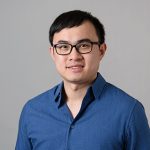 Yuyang Hu completed his PhD in Spring 2025. He started his academic journey as an undergraduate student majoring in law with a minor in applied psychology. He learned that he did not want to work as a prosecutor, judge, or lawyer, as most of his schoolmates did. Instead, he was attracted by the human mind and mental well-being and wanted to learn more about them. He switched his focus and earned a master’s degree in psychology at University of Memphis and a master’s degree in educational psychology at University of Virginia. During this period, he realized he was fascinated by family dynamics and chose to focus his efforts on family sciences when applying to PhD programs. He eventually entered UConn HDFS and worked with Dr. Beth Russell.
Yuyang Hu completed his PhD in Spring 2025. He started his academic journey as an undergraduate student majoring in law with a minor in applied psychology. He learned that he did not want to work as a prosecutor, judge, or lawyer, as most of his schoolmates did. Instead, he was attracted by the human mind and mental well-being and wanted to learn more about them. He switched his focus and earned a master’s degree in psychology at University of Memphis and a master’s degree in educational psychology at University of Virginia. During this period, he realized he was fascinated by family dynamics and chose to focus his efforts on family sciences when applying to PhD programs. He eventually entered UConn HDFS and worked with Dr. Beth Russell.
Yuyang had a clear intention to pursue a job in academia in China since his first day at UConn. To prepare for this goal, he accumulated valuable experience in research and teaching in the past four years. For most of these years, he worked with Dr. Beth Russell as a research assistant on the Connecticut School-Based Diversion Initiative (SBDI). His main responsibilities included data analyses and reports on how interventions by SBDI potentially contributed to the mental health and school disciplines of students at risk. He also worked with Drs. Kari Adamsons and Na Zhang on a substance use project and a mindfulness intervention meta-review respectively, which significantly improved his research skills. Additionally, he worked as a teaching assistant for Research Methods in HDFS (2004W) with Drs. Rachel Tambling and Keith Bellizzi and later taught the same course independently. These experiences deepened his understanding of how to be a good instructor.
Yuyang’s research interests mainly involve how parent-child relationships and parenting influence adolescents’ development in Chinese families. Because of the scope of the population, he was particularly interested in phenomena unique to Chinese families and the factors associated with these phenomena. From these interests he developed research on filial piety, a specific Chinese cultural value about child duties in families, in his general exam and dissertation. In his dissertation, he examined how filial piety values were potentially associated with Chinese parents’ parenting behaviors, and how these factors were related to children’s mental health and emotional well-being outcomes in two papers. Yuyang will soon start a new position as a postdoctoral scholar at East China Normal University and continue his research on filial piety.
Outside of his academic and work life, Yuyang enjoys exercise, martial arts, video games, and traveling.